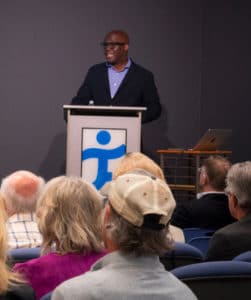Dr. Duane Mitchell talks immunotherapy cancer treatment
Published 5.5.22
While immunotherapy is a relatively recent – and promising – cancer treatment, the underpinning of it goes back more than 100 years.
That’s according to IHMC Evening Lecture guest Dr. Duane Mitchell, whose April 2022 talk focused on immunotherapy for treatment of cancers, including the aggressive brain cancer glioblastoma.

Dr. Duane Mitchell of the University of Florida speaks at an IHMC Evening Lecture in April 2022.
Mitchell is an expert in the development of innovative immunotherapy treatments for children and adults with malignant brain tumors. He is the Phyllis Kottler Friedman Professor in the Department of Neurosurgery. He serves as Director of the University of Florida Clinical Translational Science Institute and Co-Director of the Preston A. Wells, Jr. Center for Brain Tumor Therapy.
He has pioneered therapies that have been translated into first-in-human clinical trials and multi-center phase 2 studies. His cancer research has been funded by the National Institutes of Health since 2009. In his talk, he reviewed advances in immunotherapy treatments for more than 15 types of cancer including prostate, lung, breast, and melanoma.
Immunotherapy is a field that has grown significantly in the last 10 years. Historically, the concept that the immune system might recognize and try to fight cancer dates back at least to the late 1800s. As a treatment, it began gaining widespread traction in the mid-1990s.
That 100-year-old insight can be traced to a patient who had a surgical resection and then a subsequent bacterial infection. In treatment of the bacterial infection, the immune cells were spurred to respond to fight the cancer cells as well, and the patient experienced remission of the remaining cancer, Mitchell said. That began a series of experiments by Dr. William Coley, who injected patients with bacteria to try to induce this immunologic response. A form of this treatment method is used to this day, for example, in some superficial bladder cancers, Mitchell said.
The immune system sends signals either to health and repair, or fight and kill. Cancer in a sense sends the body mixed signals, Mitchell said. There are abnormalities the body can recognize, but there are also proteins that do not trigger that response. Often the result is the body’s response is to “feed, grow, and heal” the cancer rather than to “kill” the malignant cells, Mitchell said.
The immune system has both activating and regulatory signals, which tell the body to attack or not. Mitchell said, in cancer, the activating signals are being overridden by these regulatory “checkpoint” signals. The ability to block these signals has been a huge shift in treatment, Mitchell says.
These have had dramatic effect in melanoma, non-small-cell lung cancer and 15 other cancers.
“This has been a revolution of a 100-year-old concept… it’s quite a dramatic shift,” he said.

The audience at the IHMC Evening Lecture series in Pensacola in April 2022.
This has manifested in four broad types of treatment:
- Vaccine to try to stimulate the immunologic response. Loading dendritic cells with antigens or delivering the antigen into the patient so that their own dendritic cells pick up the antigen and engage the immune system.
- Adoptive cellular therapy. This therapy extracts T-cells to grow them in large numbers and then deliver the cells back to the patient.
- Immune checkpoint inhibitors. Turning these off, freeing the body’s own immune system to respond.
- Viruses modified to kill tumor cells. The response to these viruses can also trigger the immune system to attack the tumor cells.
Immunotherapy has created an extension of durable benefits and survival for some patients, but not all. Why? That’s a question Mitchell and his team, and others, are continuing to research.
The body’s microbiome has an influence on response to immunotherapy, Mitchell said. And while chemotherapy typically represses the patient’s immune system, in some cases using chemo and immunotherapy together has been shown to be quite effective, especially in certain types of breast cancers.
Brain cancer is one of the cancers that is the hardest to treat, and this is an area where Mitchell’s team at UF is actively working, as well as understanding the durability of the immune response.
IHMC is a not-for-profit research institute of the Florida University System where researchers pioneer science and technologies aimed at leveraging and extending human capabilities. For more information, visit ihmc.us.
Latest News
- STEM-Talk: Ask Me Anything with Dr. Ken Ford
- David Bear joins IHMC Board of Directors
- STEM-Talk: Michael Schmidt on building a space-faring civilization
- Florida Blue award supports health and wellness research and outreach at IHMC
- STEM-Talk: Ken Forbus on AI and his development of the Structure Mapping Engine
- STEM-Talk: Pascal Lee on returning to the Moon — and heading to Mars
- Aging Symposium draws experts to IHMC
- IHMC hosts Fredric G. Levin Lung Care Symposium March 27-28 in Pensacola
- Humanoid robotics and exoskeletons lead latest IHMC newsletter

